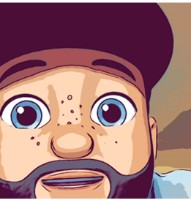Your Digital Twin: Curating the Online Version of Your Best Self

When I was a teenager, everything was analogue. Photos were physical prints—tucked into albums or shoeboxes.
Notes were handwritten, and if you wanted to call someone, you’d use a corded landline phone, probably while your
family shouted at you to get off because they were waiting for a call. Games happened outside, in the real world,
under the sun.
Compare that with the world of today’s teenagers. Every young person now has what we call a Digital Twin—a living,
growing online version of themselves. This twin isn’t just made from selfies and TikToks. It includes schoolwork
stored on Google Drive, photos posted by family members, comments made by coaches or clubs, and social media
posts by peers—or even the school. This twin doesn’t sleep. It evolves 24/7.
In my recent assembly presentation, I explored this idea through a back-and-forth with a digital avatar -“Future Me.”
Projected on screen, this AI-enhanced version of myself joked about everything from my abandoned shopping cart
(yes, there were eucalyptus bath salts in there) to my online search history. It was part comedy, part cautionary tale.
“Future Me” reminded us all that the internet never forgets—and that what we post, like, comment on, or ignore
contributes to the person we are becoming. “I’m not your ghost,” the avatar said. “I’m your legacy.”
It’s a powerful truth: AI doesn’t just show us our past—it also predicts and shapes our future. The apps we use, the
feeds we follow, the content we consume—AI curates them all based on our digital behaviour. It’s not evil or
magical—it’s mathematical. And that’s why we need to be intentional.
That word—intentional—was the heartbeat of the presentation. Because while the internet can be overwhelming,
it’s also an incredible tool. A place to learn. To connect. To be creative. But only if we use it on purpose.
So how do we help our students build a positive digital legacy?
It starts with asking good questions:
Would I want a future employer or university to see this?
Does this post reflect who I really am—or who I want to be?
Am I lifting others up, or tearing them down?
Parents, teachers, friends—we all have a role in supporting our young people to be thoughtful digital citizens. Let’s
talk to them about privacy settings, online etiquette, and how to balance real life with screen life.
And maybe, just maybe, let’s also remind them to follow through on the shopping carts they abandon. (Apparently,
the bath salts industry is booming.)
In all seriousness: Your digital twin is being shaped today. Be the architect. Be intentional. And be kind—not just to
others, but to the future version of yourself who will live with the legacy you leave behind.
Take care out there, online.
Cheers, from the Real Mr Gorrie (not the avatar – yet!)

